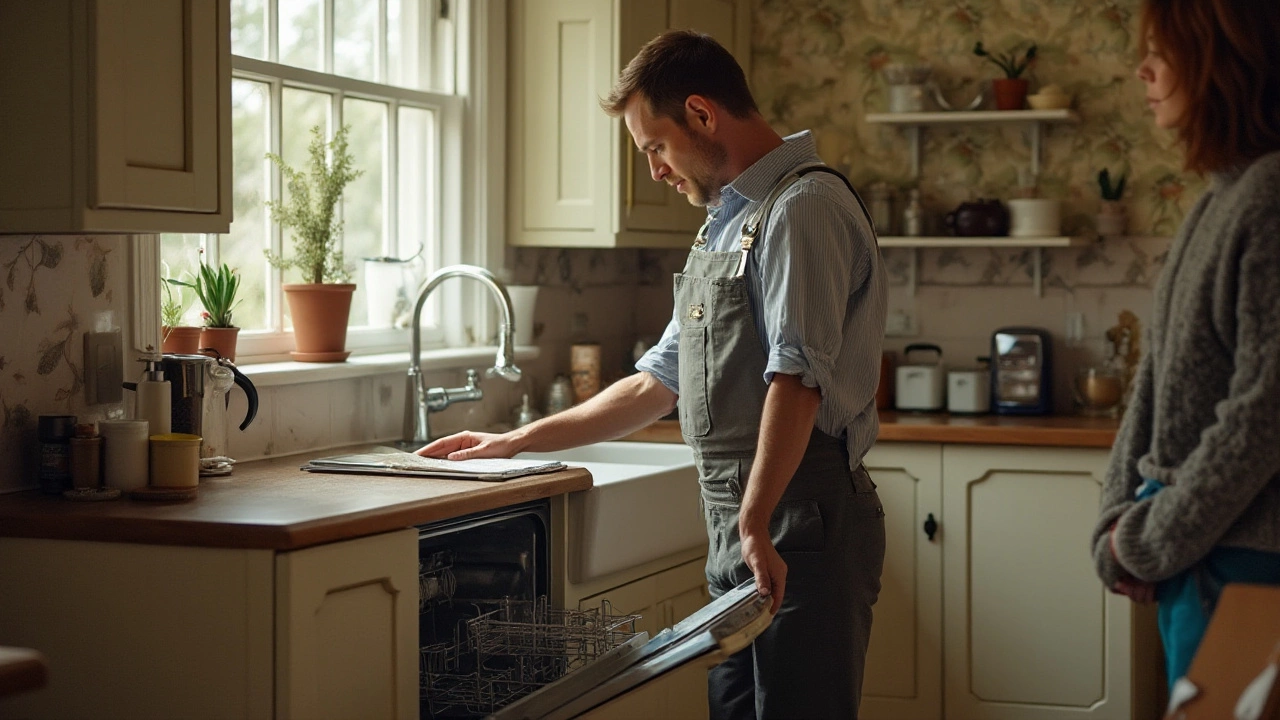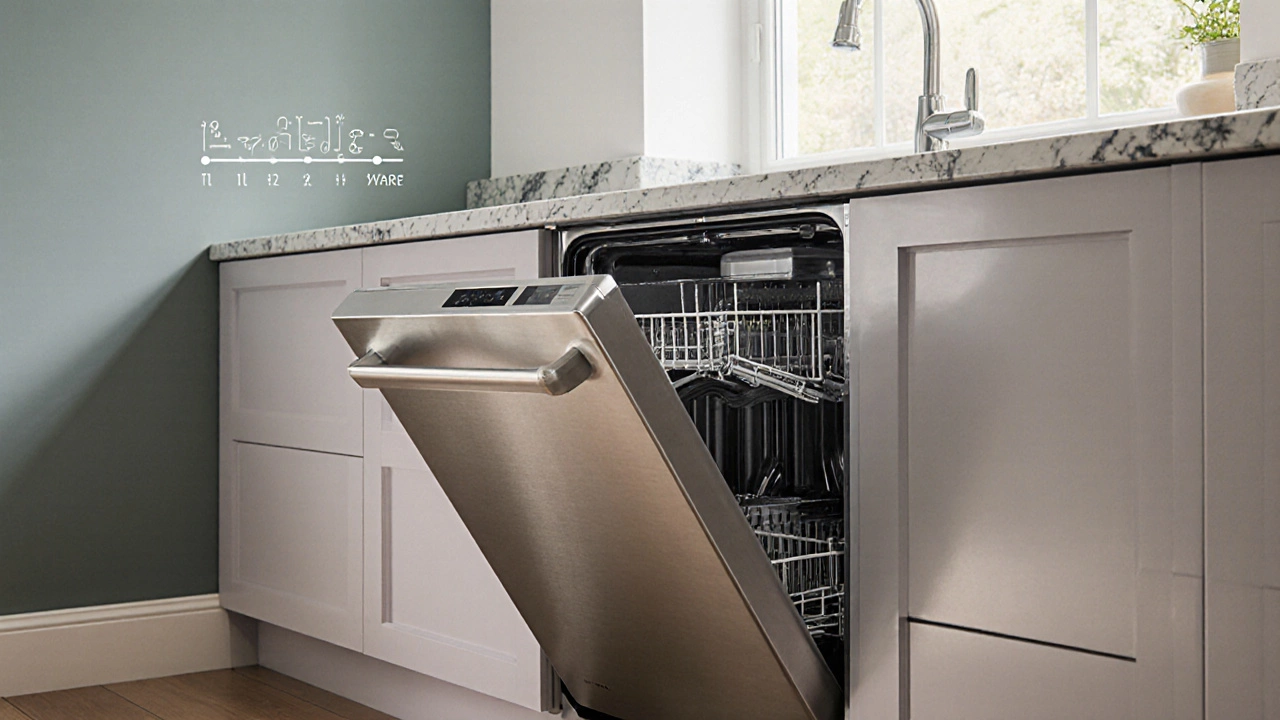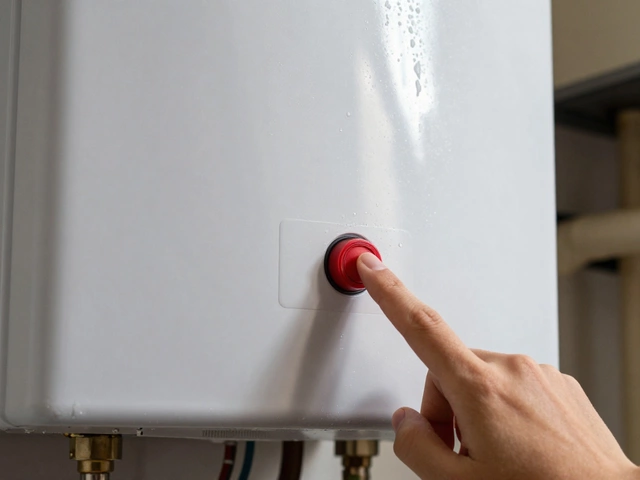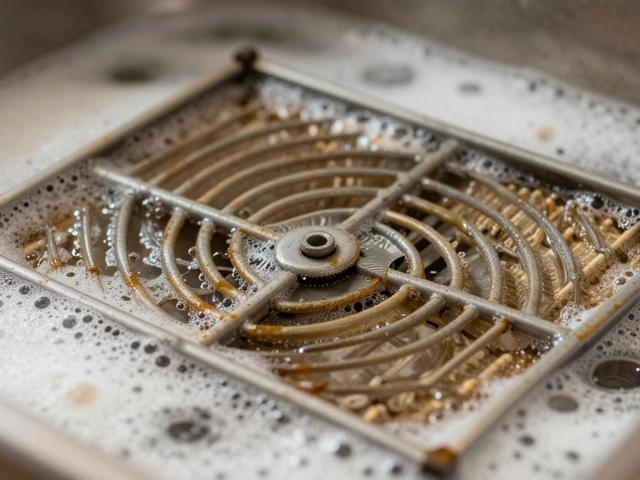In the hustle and bustle of modern life, the convenience of a dishwasher can't be overstated. However, even the most reliable machines can present occasional breakdowns, leaving us with the age-old question: should we repair or replace? This guide delves into the common issues dishwashers face, tips for troubleshooting on your own, and when it might be time to call in a professional.
From minor glitches like a clogged filter to more serious issues like a leaking pump, dishwashers are complex yet repairable machines. Understanding the basic problems and what action they require can save you both time and money. Let's explore what typically goes wrong and how these issues might be addressed.
- Common Dishwasher Problems
- Assessing Repair vs. Replacement
- DIY Fixes and Troubleshooting
- When to Call a Professional
Common Dishwasher Problems
Modern dishwashers are marvels of convenience, but like any appliance, they aren't immune to problems. One of the most frequent issues is inadequate cleaning, indicated by food particles left on dishes or a cloudy film on glassware. This can usually be traced back to a clogged filter or spray arm. Regular maintenance, such as cleaning filters and checking the spray arms for blockages, can prevent this issue. A dishwasher's performance can swiftly decline if hard water deposits or food particles are not addressed.
Another common problem is leaking. Leaks often stem from worn door seals or broken hoses. Replacing these components can typically resolve leaks. Attention should also be paid to the dishwasher's age; older machines are more susceptible to part degradation. Significant leaks could suggest pump issues, requiring more in-depth examination and possibly the intervention of a professional. Regularly inspecting the seals and connections for wear and tear can prevent such issues from escalating. A small investment in time and maintenance can avoid costly water damage.
When dishwashers won't drain properly, the main culprit is often the drain hose or the garbage disposal, which might be clogged. To tackle this, check that there are no kinks in the hose and ensure it is attached correctly. It’s beneficial to run hot water down the sink drain before starting the dishwasher to ensure a clear path for water drainage. Proactively cleaning the garbage disposal can prevent clogs from affecting the dishwasher's efficiency.
Strange noises can also disrupt the otherwise quiet operation expected from a dishwasher. These sounds can result from various factors, such as loose parts rattling or objects obstructing the spray arms. Regularly inspecting the dishwasher's interior and removing any debris can maintain the appliance's tranquility. If noises persist, it might indicate motor or pump failure, which often necessitates professional repair. Ensuring dishes are properly loaded can also prevent the knock-on effects causing noises.
Electrical and Mechanical Failures
Electrical issues, such as the appliance not starting, might originate from a blown fuse or an issue with the door latch. Before assuming the worst, it’s crucial to ensure the dishwasher isn't simply unplugged or switched off at the breaker. However, if these steps don't resolve the issue, then wiring problems or control panel failures might be at play, requiring professional attention. Regular electrical checks can spot potential hazards early.
One can't ignore the tangible benefits of a dishwasher running smoothly, as it saves money and water. According to the U.S. Environmental Protection Agency, an ENERGY STAR certified dishwasher can save an average of 3,870 gallons of water over its lifetime. Proper maintenance and timely repairs extend appliance life and conserve both energy and water.

Assessing Repair vs. Replacement
Deciding between repairing your trusty dishwasher or purchasing a new one isn't always an easy choice. This decision often hinges on a variety of factors including the age of the appliance, the extent, and cost of the damage, and your personal budget. First and foremost, consider the age of your dishwasher. Most dishwashers have a lifespan of about 10 years. If yours is approaching that age or beyond, it often makes more sense economically to purchase a new model rather than pouring money into extensive repairs. New dishwashers are more energy-efficient, offering cost savings on utility bills over time.
Another key factor is the nature of the problem itself. Troubles like a defective spray arm or clogged filter can be quick and inexpensive to fix, often involving nothing more than a small part replacement or a simple cleaning. Appliance repair commonalities frequently include issues where water isn’t fully draining or the dishes aren't coming out as clean as they should be. These issues can arise from blockages or minor mechanical parts failing, which are usually easily addressed. However, more serious matters like a malfunctioning pump motor or control board can result in hefty repair bills that rival the cost of a new unit.
"When considering repairs, remember to tally both immediate costs and potential future repairs," advises appliance expert John Maxwell. "If your appliance is constantly on the fritz, it may be time for an upgrade."
Budget is also a considerable factor. If repair costs are less than half of the price of a new dishwasher and your machine is within its lifespan, a repair might be the smarter choice. Some individuals tend to lean towards newer models, attracted by the array of advanced features like smart home integration and reduced water consumption, as these might not be available on older models. Weigh your options carefully and take note of all these aspects to make the most informed decision.
Cost vs. Value Assessment
Here's another useful way to evaluate repair versus replacement: consider a cost vs. value assessment. This method involves comparing the current market value of your dishwasher if it were working perfectly against the cost of repair. For an accurate assessment, you might even consult an appliance technician for an evaluation. A professional opinion can offer deeper insights into the condition and expected remaining lifespan of your kitchen appliance. A rough rule of thumb is if the repair costs 50% or more than the replacement cost for a new machine, replacement is worth considering. Handy homeowners might also attempt DIY repairs, which can dramatically reduce costs, especially if the problem lies in something easily accessible and replaceable.
| Appliance Age | Repair or Replace? |
|---|---|
| 0-3 years | Repair if possible |
| 4-7 years | Consider the extent of repairs |
| 8-10 years | Likely replace |
| 10+ years | Replace |
Remember that today’s models are more energy-efficient, saving on utility bills in the long run. Take into account eco-friendliness as well. Modern dishwashers consume less water and electricity, providing a chance to do your part for the environment while enjoying potentially lower utility bills. The technology advancements are also a bonus, with quieter operations, improved cleaning technologies, and sometimes even enhanced aesthetics. Balancing the monetary cost with these intangible benefits can sometimes make the decision more straightforward. Whatever your choice, ensuring that it aligns with your lifestyle and budget needs will maximize satisfaction.

DIY Fixes and Troubleshooting
Roll up your sleeves and get ready to tackle some of the common issues that can crop up with your beloved dishwasher. Before rushing to the repair shop, it's worth exploring some DIY approaches. Often, the problem can be as simple as a *clogged filter* or a *misaligned spray arm*. Start by turning off your dishwasher and unplugging it to ensure safety. Then, give your machine a good visual inspection. Check the door seal for signs of wear or cracking, as a damaged gasket could be causing a leak. Clean the filter regularly; it's typically located at the bottom of the tub and can become blocked with food particles, affecting performance.
Next, let’s dig into the operative parts. The spray arm is a crucial component, spinning around like a merry-go-round to douse your dishes with water. Ensure that it's not jammed by rogue cutlery or foreign debris. If it seems stuck, unscrew it gently, clean it with vinegar, and reposition it correctly. Don't forget to examine the door latch – a simple misalignment can prevent the dishwasher from starting altogether. Realigning the latch takes just a few minutes and can spare you plenty of headaches.
Basic Error Code Navigation
Modern dishwashers are quite sophisticated, often coming equipped with diagnostic capabilities that would put a novice detective to shame. Most have LED displays that flash error codes like cryptic messages. Grab your dishwasher’s manual and decipher these codes to better understand what's going wrong. It can be an enlightening experience that not only fixes the current issue but educates you on preventing future troubles. Some common codes relate to water supply issues or drainage problems, which can often be rectified by checking for kinks in the hose or ensuring that the water valve is open.
Troubleshooting Temperamental Machines
If your appliance isn't heating up properly, it could be a faulty heating element. These are replaceable at home with a bit of patience and the correct tools. *Remember*: before you embark on replacing any parts, always ensure the appliance is unplugged to avoid any mishaps. If the machine isn't drying as expected, inspect the rinse aid compartment; it should be full to the brim for optimal performance. Beyond these manageable repairs, regular maintenance is crucial. Cleaning the detergent drawer, running an empty cycle with a dishwasher cleaner, and ensuring that the racks move smoothly can keep your appliance ticking like a clock. As famous chef and homemaker Julia Child once said,
"The measure of achievement is not winning awards, it's doing something that you appreciate, something you believe is worthwhile."This holds true even for the humble art of dishwasher maintenance.
You'd be surprised to learn that about 20% of all dishwasher problems can be solved simply by addressing minor faults and giving the machine a thorough clean. This can not only prolong its life but also maintain efficiency, saving you money on potential costly repairs. But sometimes, no matter how proficiently you twist your wrench, the issue might persist, indicating a deeper problem that requires professional expertise. But hey, at least you tried, and that endeavor alone is a victory!

When to Call a Professional
It's often tempting to tackle household issues on your own, but knowing when to call in an expert is crucial for maintaining the longevity of your dishwasher. While minor issues like unclean dishes or noisy racks can often be resolved through simple DIY fixes, there are certain scenarios where professional help is not just a recommendation but a necessity. For instance, if your dishwasher refuses to drain, the root cause might be a problem with the drain pump or motor, which typically requires specialized knowledge and tools.
Attempting to fix these complex issues yourself might worsen the situation, leading to more extensive repairs or even replacement. Signs that indicate you need a professional include persistent leaking, electrical issues, or when the dishwasher just won't start. Water leaks might suggest a damaged seal or hose, and any electrical malfunctions, like tripping circuit breakers or failing to power on, should be handled by professionals to avoid risks like electrical shocks or fires.
Having a professional evaluate your appliance can save you time and potential hazards. A certified technician not only addresses the visible problem but also identifies underlying causes that might not be immediately evident to the untrained eye. They come equipped with the right tools and parts and have training specific to various makes and models. According to a survey by the International Association of Certified Home Inspectors, poorly repaired dishwashers have a higher failure rate, making professional repair a wise and prudent choice.
Troubles You Should Avoid Fixing Yourself
There are a number of specific scenarios where calling a repair service is the most sensible option. A malfunctioning heating element can cause your water to be cooler than necessary for effective cleaning and sanitizing. Dealing with electrical components comes with risks that shouldn't be underestimated. Moreover, if your unit is still under warranty, any unauthorized repairs can void this protection and leave you paying more out of pocket in the long run.
"When it comes to safety and ensuring that your dishwasher operates as efficiently as possible, a professional repair service can be invaluable," says James Keller, a renowned appliance repair expert. "They have the expertise to troubleshoot and repair issues correctly the first time, decreasing downtime and increasing your appliance's lifespan."
In some cases, the solution might not be to repair but to replace critical components. Professionals can guide you on whether it's cost-effective to continue repairing an aging appliance or if a new purchase would be more prudent. They might also suggest energy-efficient models that fit better with your household needs, providing long-term satisfaction. Finally, remember that regular maintenance checks by a trained professional can prevent many breakdowns, ensuring your dishwasher runs smoothly for years to come.





